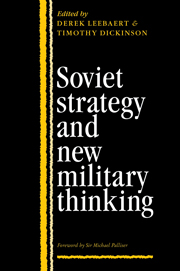Book contents
- Frontmatter
- Contents
- Notes on contributors
- Foreword
- Acknowledgements
- 1 The stakes of power
- Part I The instruments of power
- Part II Below the threshold
- Part III Managing the mission
- 7 Counter-insurgency and the lessons of Afghanistan
- 8 New weapons and the attempts at technical change
- 9 A generation too late: civilian analysis and Soviet military thinking
- 10 The other side of the hill: Soviet military foresight and forecasting
- Index
10 - The other side of the hill: Soviet military foresight and forecasting
Published online by Cambridge University Press: 03 February 2010
- Frontmatter
- Contents
- Notes on contributors
- Foreword
- Acknowledgements
- 1 The stakes of power
- Part I The instruments of power
- Part II Below the threshold
- Part III Managing the mission
- 7 Counter-insurgency and the lessons of Afghanistan
- 8 New weapons and the attempts at technical change
- 9 A generation too late: civilian analysis and Soviet military thinking
- 10 The other side of the hill: Soviet military foresight and forecasting
- Index
Summary
Few Western analysts have investigated the Soviet military's approach to the problem of foresight and forecasting despite a growing body of Soviet military literature on the topic. Professor John Erickson notes that “Forecasting has become something of a favourite Soviet pastime, indeed more than that, for it has been endowed with a certain ideological rectitude …” Forecasting (prognozirovanie), which includes highly sophisticated techniques of operations research and systems analysis, in this context, has become a basic tool in the exercise of foresight (predvidenie). And political and military foresight is viewed as a weapon which the skilled commander wields against his opponent. While Soviet authors freely acknowledge all the difficulties associated with foresight in military affairs, admitting that it is more complex than in other sectors, they still see the skill of forecasting as a key to victory over an opponent.
Foresight (military) is the process of cognition of possible changes in the area of military affairs, the determination of the perspectives of its future development. The basis of the science of foresight is knowledge of the objective laws of war, the dialectical-materialist analysis of events transpiring in a given concrete-historical context.
Foresight and forecasting have over the last decade become increasingly important because of the accelerating pace of change in military affairs …
- Type
- Chapter
- Information
- Soviet Strategy and the New Military Thinking , pp. 248 - 275Publisher: Cambridge University PressPrint publication year: 1991



